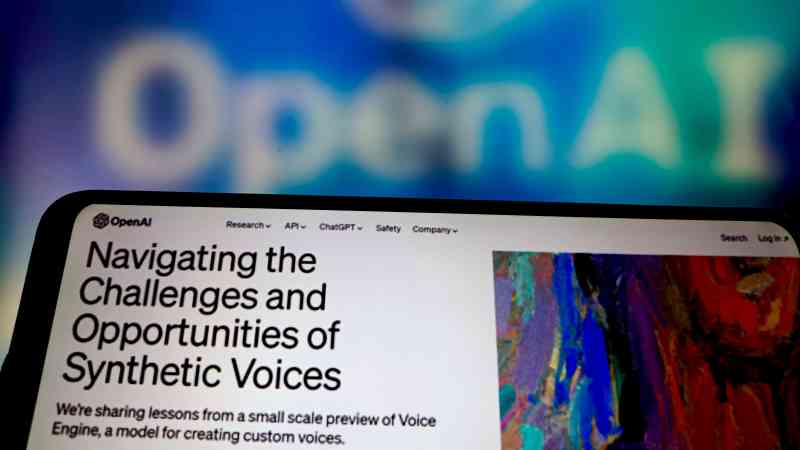I applied for a job using AI. Did I get an interview?
“How can I help you today?” my servant asks.
“Please can you use this,” I command, passing over a covering letter, “to respond to this job advert,” giving my guy the bullet-pointed brief.
Within seconds, a new letter is rattling out, my skills, experience and achievements having been shuffled into formation like diligent soldiers. The job advert’s crucial keywords — “flair” and “collaborate” — are also reflected, like sparkles of sunlight on the shore. That’s how I use artificial intelligence for job applications. (And of course I say “please” — I’m not a monster!)
Last week, HR experts were aghast at the rise of jobseekers using AI for job applications, explaining that they’d like the practice banned. However, there’s no better or quicker way to fill in an application that will meet the criteria for which the recruiters’ own AI is hunting.
• Everything you need to know about AI (but were afraid to ask)
That’s right, HR departments use AI too — they’re just furious that candidates are squaring up to them in an escalating digital arms race. Last week, for example, I sent an application for a part-time admin job at 7.30pm. At 10.12am, “after careful consideration”, it was rejected. Those bots don’t waste time: they scour applications at lightning speed, whittling down would-be employees until the pile of CVs is manageable enough for them to be read by an actual person.
While it’s received wisdom that jobseekers should treat their hunt for a new role like a job in itself, it is dull, soul-crushing work. What feels most Sisyphean to me is maintaining a peppy, upbeat eagerness, a labrador mentality. Only complete narcissists are capable of sustaining a constant flow of self-praise. How can I honestly abide myself declaring “I am efficient in completing a diverse set of tasks” when I’ve spent the whole week tapping out near-identical applications for roles I may never get? And sorry, but my cynicism is a skill and suppressing that could render me, to use some HR jargon, a “poor fit” for jobs.
I first got the idea to use AI after writing some au naturel, near-successful job applications. The roles I’m applying for fall into three buckets — commercial, managerial and creative — and so I’ve written optimum covering letters for each, which I then feed into ChatGPT. Once it has produced its attempt at a new letter, I don’t just send it off, but instead embellish its stilted, Apprentice-level HR-twanged phrases — “I am enthusiastic about the opportunity to discuss how my background, skills and passion for journalism align with the needs of [Company Name]” — to something more normal. I add examples of my achievements, a dash of smarm and some signature wit. It has not yet bagged me an interview, but that might be as much about me and the job market as my deployment of AI.
According to reed.co.uk, there was a 17 per cent decrease in job listings during the first half of 2023 compared to the first half of 2022, with a simultaneous 29 per cent rise in job applications. It gets worse; according to StandOutCV, more than a third of job listings are “ghost jobs” where there is no role at the end of the application, due to either laziness (forgetting to remove a lapsed application) or cravenness (companies pretending they are hiring to give the impression that they are growing). Meanwhile, jobs advertised on the employment-focused social media platform LinkedIn display a widget listing the number of applicants — demoralising because they nearly always exceed 100. I’ve even heard of a smoothie chain requiring a five-step process for new hires.
The fact is that since the boom in remote working, the job market has been more crowded than a midday medina — because no longer do you have to live in or near to, say, London to have a full-time job there. Even those roles that require limited office attendance are open to near-national candidates — especially those for newer tech start-ups that recognise young workers’ preference for perks such as digital nomadism over on-site snacks. In a recent role in London, I worked with colleagues who commuted — once a week, mind — from Derby and Manchester.
The need to quickly cut a field of applicants down to size, then, is obvious. Yet the scale of AI’s influence in employment truly became clear to me only when I was trying to hire someone myself.
• Will AI take my job? The view from the experts
I was working in digital publishing, looking to employ an office junior. When faced with 160 applications, I didn’t have time to be fair. HR colleagues instructed me on how I could whittle the list down using that primitive but fundamental AI function — the search tool. First, remove everyone with ambitious salary expectations. Like completed rows in Tetris, dozens disappeared. (I now respond to this question with words rather than easily targeted figures.) Then, had candidates mentioned a particular technical skill by name? Nope? Out. From there, we had about 40 people left. Spelling mistakes? Bad grammar? Incomplete answers? Out. Out. Out.
When the field is so crowded, hirers are looking for any excuse to make the process easier for themselves. So why would I make the task of applying for a job myself any harder?
One HR expert said that a telltale sign of an applicant using AI to assist their application was when they met in real life and this person “didn’t match the smooth-talker I’d spoken with earlier”. But if that hiring manager is finding candidates outpaced by AI in the charm stakes, then who is he used to interviewing? Because while AI can do a good job with the structuring of points or the framing of anecdotes, and with applying everything it’s read on the open web and condensing it, it simply cannot replicate human foibles and slang, idioms and riffs.
Don’t believe me? I asked ChatGPT to tell me a joke about applying for a job using ChatGPT, and it produced this:
“Why did the job seeker bring ChatGPT to the interview? Because they heard it had the perfect ‘resume-sponse’ rate!”
I understand that the concept of AI is scary to some but once you play about with it you’ll realise it’s heartless, charmless and simply cannot do the messy things that make us humans so special. What it does do, and will continue to do with some legislative steering, is give humans the tools to see off the boring jobs quickly, freeing our brains up to do more entertaining things.
Imagine if sheep, who have to spend their whole day chomp-chomp-chomping on grass, were able to eat just one daily portion of protein-dense, nutrient-rich food instead. When all the other candidates are grafting over new covering letters, why follow the herd?






